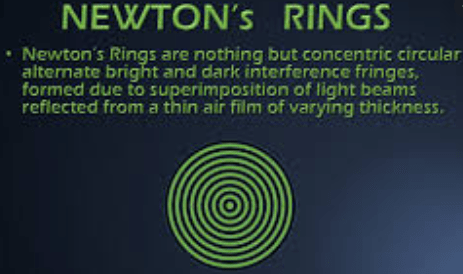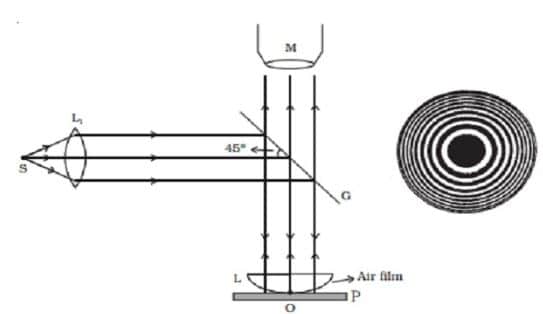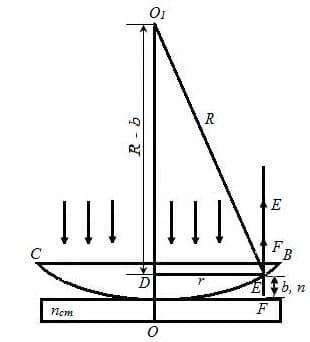Newton’s ring experiment with animation


Newton’s ring is a process in which Circular bright and dark fringes obtained due to air film enclosed between a Plano-convex lens and a glass plate. An air wedge film can be formed by placing a Plano-convex lens on a flat glass plate. The thickness of the film is zero where the lens and the plate are in contact with each other. The thickness of the film gradually increases in all directions as we go away from the center.
If such a film is illuminated by a parallel beam of monochromatic light from the top and also viewed from the same direction, dark and bright consecutive circles will be obtained. These rings are called Newton’s rings.
These rings are the result of constructive and destructive interference produced by the thin film in the region between the eyes and lens.


Experimental arrangement for newton rings experiment:
The experimental setup for Newton’s rings is shown in the figure.
The light beam from source “S’ falls on the convex lens from where the rays become parallel and strike the glass plate ‘G’. The glass plate ‘G’ partly reflected the beam and partly refract toward the mirror. The mirror ‘M’ reflects back the beam towards the plano-convex lens. The thickness of air film between glass plate ‘P’ and plano-convex increases. For center ‘o’ to outwards. So at the point of contact, the path difference becomes ‘λ/2’ and destructive interference takes place. Similarly, when there is constructive interference the bright circular rings are seen. As a result, a series of dark or bright rings are seen, these are called newton’s rings.
Size of Newton rings:


At the point of contact, there will be a dark circle due to 180 changes in the phase of the light ray reflected from the lower surface of the air film.
The radii of bright and dark circles can be found by considering the figure. In this figure consider a circle of radius r which is formed at thickness “t” of air film. If “R” be the radius of curvature of the lens then in the triangle DBO1:
Why newton rings are circular in nature?
Newton rings are circular in nature because the air film is symmetrical about the point of contact between the plano-convex lens and the glass plate.
Newton’s ring experiment ( Video):
- https://en.wikipedia.org/wiki/Newton%27s_rings
Related Post
Recent Posts
Is energy quantized in classical physics?
No, according to classical wave theory the emission of electromagnetic radiations from the surface is…
Types of laser
Basically, there are four types of laser which includes: Gas Lasers Solid State lasers Liquid…
Ultrasound frequency range
What is ultrasonics? The study and application of mechanical vibrations with frequencies beyond the limits…
Electromagnetic Energy: What are some examples of it?
Electromagnetic energy definition Electromagnetic energy is the amount of energy stored in a region of…
Fundamental units and Derived Units with Examples
The Main Difference between fundamental Units and Base units is that Units that Express base…
Newton’s First law of Motion Examples in Our Daily Life
Newton's first law of motion states that " A body continues its state of rest…
